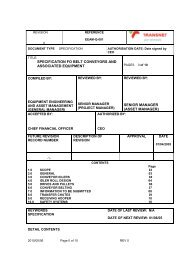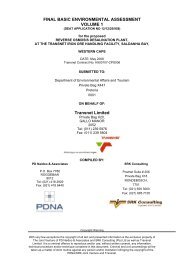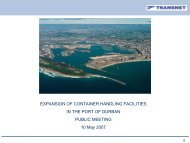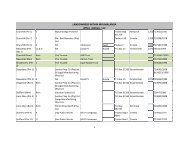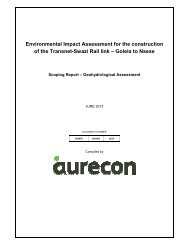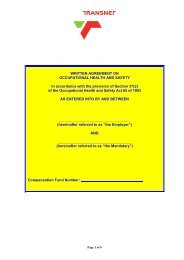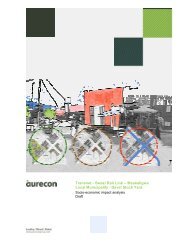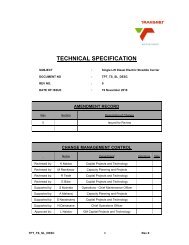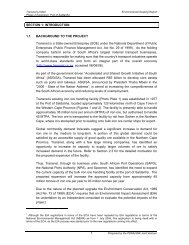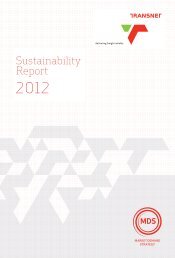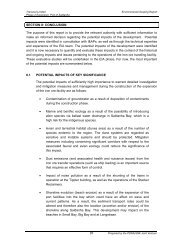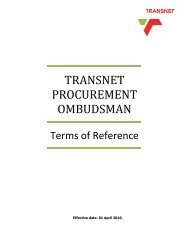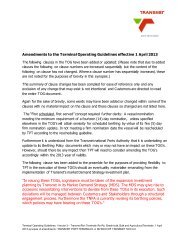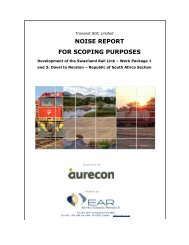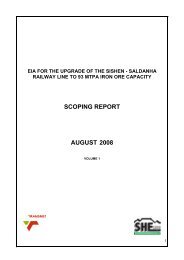Version1: Applicable from 1 April 2011 - Transnet
Version1: Applicable from 1 April 2011 - Transnet
Version1: Applicable from 1 April 2011 - Transnet
Create successful ePaper yourself
Turn your PDF publications into a flip-book with our unique Google optimized e-Paper software.
6. CARGO, SECURITY & HARBOUR MOBILE CRANE CRITERIA<br />
6.1. Dispatch of cargo<br />
6.1.1. Arrangements and planning for the dispatch of all landed cargo <strong>from</strong> the terminal by<br />
the Customer/representative must occur at the Phase II to avoid storage charges<br />
being raised.<br />
6.2. Retention of cargo<br />
6.2.1. Cargo will not be allowed to remain in the terminal unless a written agreement is<br />
reached on the terms on which it will be permitted to remain in the terminal. Should<br />
cargo remain in the terminal in the absence of such written agreement or beyond<br />
any agreed time, TPT may have the cargo removed at the Customer’s sole cost and<br />
risk and to raise storage charges at the rate applicable thereto <strong>from</strong> time to time, or<br />
to treat such cargo as having been abandoned and may deal with it in accordance<br />
with the provisions of section 6 (Schedule 1) of the Legal Succession to the<br />
Transport Services Act, 1989. In such event, TPT will incur no liability for any loss of<br />
or damage to such cargo and is entitled to full indemnification <strong>from</strong> the Customer for<br />
any costs or loss incurred by TPT in relation to or as a result of TPT having dealt<br />
with such cargo.<br />
6.3. Miscellaneous Services<br />
6.3.1. All work done or services rendered over and above those normally associated with<br />
the activities which are the subject of the Phase II requirements/ cargo working, are<br />
subject to additional charges which will be raised by means of the issuing of a<br />
Miscellaneous Services Note (MSN).<br />
6.3.2. All requests for additional services (Miscellaneous Service Request: MSR) must be in<br />
writing and directed to the CPO. Following the acceptance of the MSR, a<br />
Miscellaneous Service Note (MSN) will be used as a source document for billing.<br />
6.3.3. Customers, shipping lines or their representatives may not directly request or<br />
instruct any of TPT’s employees or machine/equipment operators to execute any<br />
function whatsoever. All instructions must be given in writing through the CPO.<br />
6.3.4. If a MSR is not submitted to the CPO and a service or services has/had been<br />
rendered or is required, then the TPT berth manager must immediately inform and<br />
confirm the rendering of such service to the representative in writing by way of e-<br />
mail, fax or hand delivery within 24 hours of the service having being provided or 24<br />
hours after vessel completion. The TPT Operations Manager will raise the MSN for<br />
the extra services carried out and submit it to the CPO or amend the Phase II minute<br />
for endorsement.<br />
Terminal Operating Guidelines: Version 3 – <strong>Transnet</strong> Port Terminals Ro-Ro, Break-bulk, Bulk and Agricultural Terminals: 1 <strong>April</strong> 2013<br />
TRANSNET PORT TERMINALS, A DIVISION OF TRANSNET SOC Ltd 30



